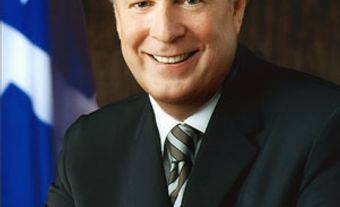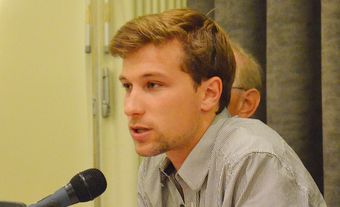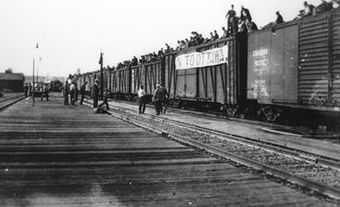In 2012, Québec and Canada experienced the longest student strike in their histories. The strike lasted several months (from 13 February to 7 September 2012) and pitted students in Québec against the provincial government on the issue of tuition fee increases. Major demonstrations were organized in Montréal and in other cities and towns in the province. The conflict culminated in the adoption of a special law — Bill 12, more commonly referred to as Bill 78 — that forced students back to class and limited their right to protest.
The Student Movement in Québec and Tuition Fee Increases
The student movement in Québec emerged in the wake of the Quiet Revolution, at the end of the 1960s. Historically, student demands concerned educational opportunity, tuition fees, the loans and grants system (see Financial Aid to Students) and free education. Student associations have used strikes as a pressure tactic on a number of occasions. Major strikes took place in 1968, 1974, 1978, 1986, 1988, 1990, 1996 and 2005.
On 18 March 2011, the Québec government, led by Jean Charest and the Liberal Party of Québec, tabled a budget that provided for a hike in university tuition fees. At $325 per year between 2012 and 2017, the increase would amount to $1,625, a 75 per cent increase from $2,168 to $3,793. This led to significant political protest and a number of disruptions to public order in the province in 2011. At the beginning of December 2011, more than 60,000 students formed a temporary coalition called CLASSE (Coalition large de l'Association pour une solidarité syndicale étudiante,or “broad coalition of the Association for Student Union Solidarity”) with the aim of triggering a general strike. A few weeks later, the associations representing CEGEP (college) and university students — the Fédération étudiante collégiale du Québec (FECQ) and the Fédération étudiante universitaire du Québec (FEUQ) — announced their intention to join the strike.
A Divisive Yet Uniting Conflict
By 13 February 2012, the majority of student associations in Québec were on a general strike, some for an indefinite period. At the time of the 22 March 2012, demonstration that brought together between 100,000 and 200,000 people in Montréal, close to 310,000 students (out of 400,000 in the province) were on strike. As part of the global phenomenon of student youth mobilization, the movement received significant media coverage in Canada and elsewhere around the world. It was dubbed the “Maple Spring,” a nod to the term “Arab Spring” — an expression referring to popular protest movements that have taken place in North Africa and the Middle East since December 2010.
Celebrities such as singer Paul Piché, members of the musical group Les Cowboys fringants, producer Guy A. Lepage and director Paule Baillargeon openly supported the students. They notably wore a small red square pinned to their clothes, the symbol of the fight against the tuition fee increase. Close to 200 members of the artistic community, unions and the political world signed a manifesto expressing their solidarity with the movement. Others such as comedian Yvon Deschamps and the former minister of education Jean Garon (1994–1996) spoke publicly and denounced the Charest government’s lack of openness in response to the students’ demands. The principle of free education received significant support when sociologist Guy Rocher and former Québec premier Jacques Parizeau spoke in its favour.
In contrast, former Québec politicians such as Lucien Bouchard and the former Liberal finance minister Monique Jérôme-Forget supported the fee increase. To protest the student strike and support the increase in tuition fees, approximately 4,000 students formed the Mouvement des étudiants socialement responsables du Québec (MÉSRQ), or “Socially Responsible Students Movement.” In addition, several student associations refused to join the indefinite strike, preferring to suspend courses during the major demonstration on 22 March. In Montréal and Sherbrooke, students wore a green square, a symbol of their opposition to prolonging the strike. There was also little support from students in other provinces, where tuition fees are much higher than those in Québec.
On 24 April, the government excluded one of the student associations, CLASSE, from discussions on the fee increase, triggering major demonstrations every night in the streets of Montréal. These protests were marked by acts of vandalism, massive numbers of arrests and police brutality. In Victoriaville, when a demonstration turned into a riot, one student was seriously injured and lost sight in one eye. In 2013, a commission of inquiry was established to examine these incidents.
The general public was divided on the question behind the student conflict; some people even demanded that the government call in the armed forces. The student movement was also less united than it appeared at first glance. Some students did not hesitate to seek court injunctions so that pickets in front of classrooms would be lifted. This recourse to the courts was a first in the history of student strikes in Québec.
Bill 78: Source of Controversy
The situation culminated on 18 May, when a special law was passed by the National Assembly of Québec. Bill 78 (Bill 12) included various measures to ensure that students returned to class and outlined steep fines for individuals, student associations and unions that interfered with class schedules. This measure restricted the right to demonstrate, which is contrary to the rights and freedoms guaranteed by the Québec Charter of Human Rights and Freedoms.
Denounced by the opposition parties — the Parti québécois and Québec solidaire — but also by the United Nations, the new piece of legislation drew strong opposition from many Québécois. Students and citizens of all ages defied the law and demonstrated their unhappiness in the streets of Montréal by banging on pots. These spontaneous “concerts de casseroles” (concerts of pots and pans) spread rapidly to other regions in Québec and to other Canadian cities. On 31 May 2012, during the first game of the National Hockey League finals, a “Casseroles Night in Canada” took place. In solidarity with the student movement in Québec, pots and pans rang out from Vancouver to Halifax.
Issue Resolved or Merely Postponed?
On 1 August 2012, Jean Charest’s government called a general election and asked the “silent majority” to express its opinion on the question of tuition fees by electing his party to a fourth term. The student strike thus became a political issue. Pauline Marois, leader of the Parti québécois, promised to repeal Bill 78 and hold a summit on higher education if her party was elected on 4 September. Less than two weeks after the election, the new minority government led by the Parti québécois repealed Bill 78 and cancelled the tuition fee increase.
The student associations that had in the meantime voted to end the strike and return to class called it a historic victory for the student movement. By the end of the summit on higher education held in February 2013, the question of the under-financing of universities in Québec had not been resolved. Nonetheless, the 2012 student movement spurred a public debate on accessibility to education, teaching quality and the contribution of universities to development in Québec.

 Share on Facebook
Share on Facebook Share on X
Share on X Share by Email
Share by Email Share on Google Classroom
Share on Google Classroom




